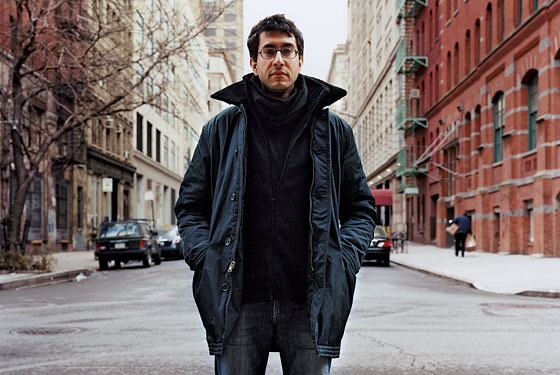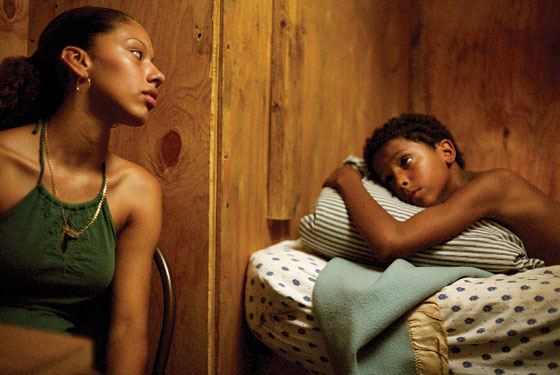
Reality is hard to fake. That’s why the final shot of Chop Shop took Ramin Bahrani about 50 takes and three weeks to compose. Mostly, it was the pigeons. Bahrani had to corral them himself.
In the hot August of 2006, the 32-year-old Iranian-American filmmaker woke up at dawn every morning in what he calls his “shithole” apartment under the JMZ and took the G to the 7 to his set in Queens: the Iron Triangle. Wedged between Shea Stadium’s parking lots, Willets Point is a kind of permanent traffic jam blaring reggaeton and rap—a triage clinic of clanging auto-repair shops, into which cars with various afflictions lurch. In The Great Gatsby, F. Scott Fitzgerald called this once-wasteland train stop between West Egg and Manhattan the Valley of Ashes—and set the novel’s most awful events there. More recently, Bloomberg called it one of the “bleakest parts” of Queens. Bahrani’s film plunges you into the thick of it.
“Visually it’s incredible,” says Bahrani. “People are fighting each other for a car to come to their garages, potentially fistfighting, then fifteen minutes later a soccer game erupts—and by the end of the day, they’re having a cookout and drinking beer.”
He spent more than a year hanging out there, noticing little things, like the way pigeons would perch atop the garage of Carlos Ayala every morning, waiting for the mechanic to emerge with birdfeed. “That is a motherfucker, that shot,” says Bahrani, who stole Carlos’s pigeons. “For three weeks, I got there before Carlos, shook the lock on his garage door, and they’d all fly down. I’d feed them, make a little trail, and day by day, I got them closer to the set, eight shops and a street away. Then we shot 50 takes until we got it right, two guys waving brooms to keep them in the shot.”
When that final shot triggered a standing ovation at the film’s Cannes premiere last spring, Iranian auteur Abbas Kiarostami embraced Bahrani. “He had tears in his eyes, he kissed and hugged me,” says Bahrani. “I had an apartment for three more nights, but I left the next day. What else did I need?”
Bahrani has been championed by the film Establishment—from the editor of Cahiers du Cinéma to Roger Ebert—for updating the neorealist European traditions of Rossellini and Bresson. And though he was born and raised in North Carolina, he spent three years in Iran, absorbing the observational, immersive tradition of Iranian directors like Kiarostami. But here in New York, his films Man Push Cart (about a Pakistani street-cart vendor) and Chop Shop don’t feel like throwbacks. Rather than just stand on the shoulders of Cassavetes and Lionel Rogosin, they catch New York’s next generation of immigrants and invisibles with documentary clarity and a bracing lack of sentimentality. “Other young filmmakers are wandering around, trying to figure out what they want,” says Film Society of Lincoln Center programming director Richard Peña. “Ramin is doing precisely what he wants.”
Chop Shop follows a 12-year-old Latino boy and his 16-year-old sister who live without parents in a closet-size room inside the garage where the boy works as an apprentice to mechanic Rob Sowulski (who plays himself). “I was immediately drawn to these kids” in Willets Point, says Bahrani, “that they would be in this world with this dumb, ridiculous sign at Shea hanging over them that says MAKE DREAMS HAPPEN.”
The kids are played by Alejandro Polanco and Isamar Gonzales, extraordinary East Side Community High School students with no acting experience, selected after 650 auditions and repeated callbacks. In another director’s hands, this could have been a maudlin tragedy, but Bahrani is hardly some bleeding heart. “I’m not a very nice person when I work,” he says. “I know exactly what I want, and I will do everything to get it.”
An immense effort goes into Bahrani’s deceptively simple cinema: For Man Push Cart, he made untrained actor Ahmad Razvi work the food cart for weeks. For Chop Shop, he required Polanco to work in Sowulski’s auto-body shop for six months, where he learned to paint, sand, and even—at the age of 12—drive.
“People thought we were making a documentary about this kid who worked for Rob,” says Bahrani. “But this is nothing new. Daniel Day-Lewis, he does this on his own: Six or seven months, he immerses himself. What the fuck does Alejandro know about this stuff? He’s not an actor. I have to make him do it.”
When Bahrani noticed that Polanco had a habit of holding his hands near his chest, he would slap his arms and yell, “Fag! Pussy! You look like a fag!” When Polanco couldn’t quite get angry enough for one audition, Bahrani broke a clipboard and screamed in his face, “You fucking pussy, do something!” And when one scene fell flat, Bahrani gamed the setup.

“At 9, Alejandro witnessed a murder in a bodega on his street—one night filming, sirens went off and he was freaking out, and I remembered that,” says Bahrani, whose scene called for Alejandro’s character to discover his sister having sex in a car with a strange man. “I gave the guy a fake gun. I said, ‘Hold this to Izzy’s head.’ The moment comes, Alejandro saw that gun, and he freaked out—he attacked that motherfucker, cut his nose, ripped his shirt. And that’s the take I used. Now, tell me: Is that fiction or documentary?”
When I suggest that, either way, maybe that’s a bit much for a 12-year-old, Bahrani just smiles. “He freaked out, and then minutes later he’s laughing about it,” he says. “He’s so resilient, so tough.”
To Bahrani, this is the only way. “You want to put in the real effort, get a real teacher, not a movie star. Not Ryan Gosling. He ruins [Half Nelson]. The whole film, he looks like he wants to get laid.”
Bahrani doesn’t exactly dislike Hollywood’s happy endings; he distrusts them. He won’t let it show, but this tough, streetwise director is also a closet romantic, prone to quoting the Sufi poet Rumi. In some way, his films are also inspirational stories—not of success, but of endurance. Bahrani demands that uplift be rendered on a more human scale—and so persuasively that even a tough-minded realist like himself can believe in it. “I think that’s part of why I root my films in such a realism that it becomes palpable,” he says. “I wish that I had the resilience of Alejandro, that I was that nonjudgmental. I wish I could be like my films.”
SEE ALSO
• Exclusive Clips From Chop Shop
Chop Shop
Koch Lorber Films. NR.
Opens February 27 at Film Forum.